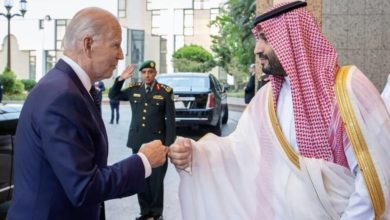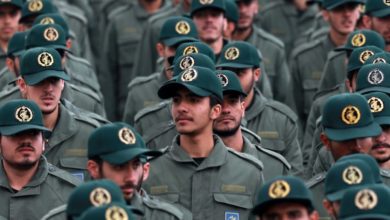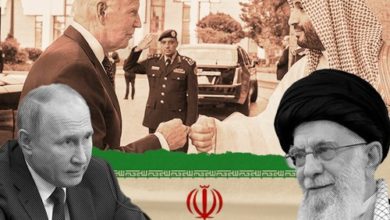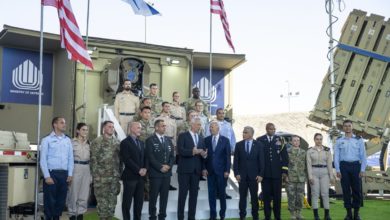On Sept. 24, the board of governors of the International Atomic Energy Agency approved a European Union resolution declaring Iran to be in non-compliance with the Nuclear Non-Proliferation Treaty. Of the 35 nations on the board, 22 voted for the resolution and 12 abstained. Only one, Venezuela, voted against it. The resolution authorized the Nov. 24 meeting of the board to refer Iran’s case to the UN Security Council.

The United States had campaigned intensively to reach a near unanimous decision. But the 12 abstentions reflected the view of many oppressed nations that the approach taken on Iran amounts to denying the rights of non-nuclear nations to develop nuclear energy.
If the case is referred to the Security Council, China and Russia—both having friendly relations with Iran—may veto possible sanctions. China depends heavily on energy imports from Iran, while Russia has extensive economic ties with Iran.
But even if it is vetoed, a majority Security Council vote may be all that the Bush administration will feel it needs to justify an eventual military action against Iran. This would be more “international consensus” than was needed for the colonial invasion of Iraq, which the United States never took to the Security Council at all.
The U.S. government alleges that Iran has violated the Non-Proliferation Treaty. According to that 1968 treaty, non-nuclear nations were to refrain from developing nuclear weapons but were entitled to develop nuclear energy. The nuclear powers, including the United States, were to eliminate their nuclear arsenals and provide non-nuclear nations with nuclear technology for peaceful purposes. The basic aim of the treaty was to gradually move the world toward being free of nuclear weapons.
Article IV of the treaty gives any signatory “an inalienable right to develop, research, produce and use nuclear energy for peaceful purposes,” and to acquire technology to this effect from other signatories.
Article VI calls for nuclear powers to destroy nuclear weapons. That means that the world’s major countries with nuclear arsenals are in breach of the treaty. The United States, with the largest stockpile of nuclear weapons in the world, has not only refused to destroy its nuclear weapons but has increased the destructive capabilities of its nuclear arsenal. It has prepared for and repeatedly threatened first-strike nuclear attacks and pursued nuclear “superiority” to ensure what it calls “Full Spectrum Dominance.”
John Deutsch, CIA director during the Clinton administration, aptly described the attitude of the United States toward the Nonproliferation Treaty: “The United States never intended nor does it now intend to implement Article VI. That’s just something that you say to get what you want out of a conference.”
Iran’s alleged non-compliance
Secretary of State Condoleezza Rice has repeated time and again that Iran would be expected to respect its “international obligations,” presumably meaning its obligations under the Non-Proliferation Treaty. But what are the specifics of Iran’s alleged non-compliance?

In October 2003, Iran announced a freeze on uranium conversion, a precursor to uranium enrichment, as a goodwill gesture during its negotiations with the countries known as the EU3—France, Germany and Britain. The IAEA acknowledged that the freeze was voluntary and not mandated by any treaty. The main “obligation” that Iran has not lived up to is ending the voluntary freeze in August 2005, when Iran resumed uranium conversion at its Isfahan plant.
The resumption of uranium conversion was the result of the Iranian government’s frustration with the impasse in its ongoing negotiations with the EU3. Some European diplomats, off the record, have admitted to the Sept. 7, 2005, Asia Times Online that the package offered by the EU3 was “an empty box of chocolates.” But “there is nothing else we can offer,” the diplomats went on to say. “The Americans simply wouldn’t let us.”
The EU3 offer would require Iran to forgo its right to uranium enrichment, a permitted activity under the Nonproliferation Treaty. Receiving uranium from abroad would obviously make the entire nuclear program dependent on other nations. The economic incentives offered were insignificant items like the offer to allow Iran to purchase commercial airliners, currently prohibited due to U.S. sanctions on Iran.
Iran has also voluntarily signed an additional protocol that allows the IAEA to inspect nuclear facilities in Iran. In fact, the IAEA has been monitoring various nuclear facilities with frequent inspections and using on-site cameras.
Iran’s other alleged violations are extremely minor, like missing deadlines for filing official declarations.
The imperialists’ main claim against Iran about a clandestine nuclear weapons program has to do with a number of centrifuges discovered by the IAEA inspectors in 2004 that had traces of weapons-grade uranium on them. Iranian authorities argued that the origin of the contamination was Pakistan, the country from which the centrifuges were purchased. In August 2005, the IAEA confirmed Iran’s explanation.
Prior to the September vote of the governing board, IAEA head Mohammed El Baradei had repeatedly stated that Iran was cooperating with the IAEA. On Sept. 15, he said, “Have we seen any proof of a weapons program? Obviously until today there is none of that.”
The IAEA and imperialism
Iranian officials have correctly described the IAEA governing board’s Sept. 24 decision as having no legal basis. But relations between imperialist powers and oppressed countries are not decided by laws and treaties.
With the U.S. domination over most international bodies, most often supported by junior imperialist partners, international laws are enforced in ways that suit their interests. Imperialist powers refuse to destroy their nuclear arms. Israel has over 200 nuclear warheads while refusing to sign the Non-Proliferation Treaty at all. The United States openly threatens the world with first use of nuclear weapons with impunity.
Yet all these nuclear powers cite Iran for nuclear non-compliance and threaten sanctions against it.

The same imperialist forces that struggled to get UN approval for the invasion of Iraq, or support the UN-backed coup regime in Haiti, ignore this obvious fact. In a world dominated by imperialism, hopes of finding justice through international bodies, non-governmental organizations or civic institutions are illusory at best.
Iran’s economic advances
Since the 1979 revolution, Iran has been transformed from a U.S. client state, as it was under the Shah, to an independent regional economic and political power.
Signs of rapidly growing industrialization are omnipresent. An example is Iran’s emerging auto industry, the number one producer in the Middle East, with annual production of approximately 750,000 vehicles. Rather than setting up assembly plants for international auto manufacturers, the Iranian state has signed joint ventures with various South Korean, French and German auto companies in which Iran holds majority interest.
Iranian manufactured automobiles and auto parts are exported to many regional countries, including former Soviet republics, countries in the Persian-Arabian Gulf region and even African countries. Iran also manufactures buses, trucks and tractors.
Electricity production and distribution is another example of the success of Iran’s independent industrial development. Even most remote villages now have electricity, potable water and telephone lines. There are now 6 million mobile telephone subscribers, and a second network of mobile lines is being constructed.
Gains in agriculture
Iran’s agricultural production has seen significant growth in recent years. It is currently growing at an annual rate of 4.5 percent and is expected to increase. In 2005, Iran achieved self-sufficiency in wheat and rice, the main staples of the Iranian diet. The government projects reaching self-sufficiency on all agricultural products by the end of the 2005-2010 economic plan.
Peasants, who used to pay a hefty percentage of their crops to landlords, even after the formal abolition of feudalism under the Shah, now keep all the fruits of their labor. Three other factors have contributed to the increase in agricultural production.
The first is roads. An impressive network of highways and roads built over the last two decades has made it possible to get agricultural products from the farms to the cities and towns, where 67 percent of the population now lives. Making villages more easily accessible, roads have also contributed to the improvement of the health and education of the rural population.
Tractors and combines have also improved the productivity of agricultural production. Much of the work that used to be done manually and through intense labor is now mechanized. The ongoing migration from the countryside to the city is not the product of worsening conditions in the countryside—in fact, those conditions have improved substantially. But with mechanized agriculture, there is far less need for people, especially young men, to stay in the villages.
Another factor that has contributed to the improvement of agriculture is the construction of dams. Most regions of Iran have an arid climate. Water is a scarce resource. Eighty dams are now in operation, compared to only 13 before the revolution. Four of the five largest dams in the Middle East are in Iran.
Gains in health and education
A steady improvement in public health and welfare indicators points to the success of the policies of economic nationalism pursued by the Islamic Republic. There are nearly one million college students, 51 percent of them women, aggressive literacy campaigns had increased the adult literacy rate to 83 percent by 2000, according to UNICEF.
Improved access to clean water and sanitation has also played an important role in improving the quality of life for most Iranians. By 2002, UNICEF reported that 83 percent of the rural population was using “improved water sources,” along with 98 percent of the urban population.
This year, the government launched a new program issuing health care booklets to all villagers, enabling them to receive health care at public and private health care facilities at a nominal cost. By the time the program is completed this year, all villagers will not only have full access to health care but also retirement benefits.

Independent economy blocks imperialist penetration
With these huge expenditures on infrastructure, one would expect Iran to have large international debts. This is not the case. By the end of 2004, Iran had an estimated foreign debt of $11.9 billion, or 8 percent of the GDP, according to the U.S. government’s Energy Information Administration.
Compare that to countries where imperialists have had a free reign in implementing their neo-liberal agenda. Argentina, the 1990s poster child for conforming to the dictates of the International Monetary Fund, has a foreign debt of $147 billion—96 percent of the GDP. Iran’s neighbor Turkey, a member of NATO and a country that has implemented every program that international financial institutions have demanded, has a foreign debt of $114.3 billion, or 40.7 percent of its GDP.
Given Iran’s development of its national economy, international capital is obviously deprived of making the kind of investment that brings in an abundance of super-profits. The IMF and the World Bank have been unable to implement their programs to make Iran an indebted nation.
These are enough reasons for Washington’s pursuance of a policy of regime change in Iran.
Iran is not a socialist country—far from it. The state represents Iran’s bourgeoisie, not the working class. The national bourgeoisie, whose interests are contrary to imperialist capital penetration, has amassed tremendous wealth through exploiting the working class. Furthermore, the Islamic Republic pursues many reactionary social policies that contribute to the oppression of women, repress leftist forces and curtail democratic freedoms.
But despite crocodile tears shed by Bush and other imperialist politicians for violations of human rights, these reactionary social policies are not what put Iran on the U.S. hit list. U.S. client states in the region, Saudi Arabia and Kuwait for instance, are far more reactionary on social issues than Iran’s Islamic Republic.
From the imperialist perspective, Iran is a bad example. If Iran can make such advances by pursuing an independent path of development and blocking off the penetration of international capital, other countries in the world might potentially try to follow this path.
Political independence
In addition to economic interests, U.S. imperialism has compelling political motives to pursue its “regime change” policy. Since the revolution, Iran has taken an anti-imperialist stance in international affairs. The Islamic Republic has no diplomatic relations with the United States and has never recognized the state of Israel.
On Oct. 26, President Mahmud Ahmadinejad participated in a conference titled “The World Without Zionism.” The conference and the subsequent march was part of the annual “Qods (Jerusalem) Day” event held in Tehran in solidarity with the people of Palestine. In this conference, Ahmadinejad called Israel a “disgraceful blot” that should be “wiped off the map.”
Ahmadinejad was widely condemned by pro-imperialist politicians and media for this remark. Some Iranian politicians joined the chorus. But contrary to the propaganda, this comment was not a call for the massacre of Jewish people. It was a condemnation of the settler state of Israel.
Iran has a Jewish minority numbering around 10,000 to 15,000, according to the “Judaism Online” website. No harm has come to Iranian Jews. Despite their small numbers, they have always been represented in the parliament with a seat reserved for the Jewish minority.
Ahmadinejad’s comments were made in the context of a revolutionary slogan, not a policy statement of a head of state. Similar comments have been made by various Iranian officials since the revolution, including the leader of the revolution, Ayatollah Khomeini.
But given the high stakes of the nuclear issue, the possibility of Iran being referred to the UN Security Council, and the international attention focused on Iran, it is unlikely that Ahmadinejad was surprised by the reaction to his comments. Most likely, the president’s blanket condemnation of Israel was a deliberate act.
Islamic Republic rulers have always been divided into many factions. Currently, two factions seem to be forming around how to handle the nuclear case and Iran’s approach to the United States and the EU. One approach, championed by former president Akbar Hashemi Rafsanjani—who lost the recent presidential election but is still the head of the powerful Expediency Council—is in favor of engaging in negotiations and making concessions.
Mobilizing against U.S. intervention
Ahmadinejad, who has close ties to the Revolutionary Guards and the all-volunteer Baseeji army, seems to be following a different approach. He is attempting to mobilize the masses against a possible U.S. military intervention. He has declared time and again that he sees no purpose in negotiating with the United States.
By standing firm on Iran’s right to develop nuclear energy, its sovereignty and the rights of the Palestinian people, Ahmadinejad is moving in the direction of mass mobilization. Regionally, this has the potential to win support for Iran among the Arab masses.
Whether or not Ahmadinejad’s gamble pays off, a U.S. calculation of the balance of forces will ultimately determine whether or not there will be an invasion of Iran. The real motives behind the policy of regime change have nothing to do with the nuclear issue, human rights or the level of congeniality of Iranian leaders toward the United States or Israel. As the experience of Syria is proving once more, making concessions is no guarantee against further acts of aggression by the imperialists.
The heroic resistance of the people of Iraq has, for the time being, kept U.S. imperialism from committing further acts of aggression in the region. The level of resistance the United States might encounter if Iran is invaded is a major factor in the calculations of Pentagon planners. Another factor is the level of resistance they might encounter domestically from the anti-war movement, and the chances that the movement might radicalize.
Standing with the people of Iran against imperialist threats and aggression is a duty for progressive forces in the United States.
Anti-U.S. sentiment in Tehran, Oct. 21, 2005.
Photo: Siavash Habibollahi
Tehran Nuclear Energy research building
Photo: Mohammad Kheirkhah
Women protest IAEA decision to close uranium conversion plant in Isfahan.
Photo: Abedin Taherkenareh
“Qods Day” marked with anti-Israel protest in Tehran, Nov. 21, 2003.
Photo: Abedin Taherkenareh






